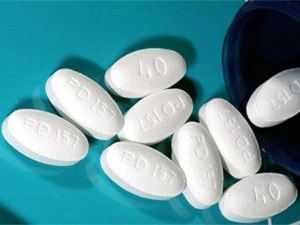
It's a hot summer and time to relax. With most of us lucky to take some time to chill out, life couldn't feel better. Right?
Well, not so fast. New research adds more heft to that old adage: If you are feeling fine, you just haven't had enough tests.
A study published last month in the Canadian Medical Association Journal found that muscle-weakening, one of the most common adverse effects related to drugs to lower cholesterol (statins like Crestor, Lipitor or Zocor) can be found in patients who have no apparent symptoms.
The fact that some patients taking statins experience muscle pain or cramps is not exactly groundbreaking news. If you are taking these drugs and find you have trouble getting out of a chair without arm support you may be among the 10 to 15 per cent of the statin-consuming population who experience some kind of muscle weakness or muscle pain. It's a common possible reaction to the drug.
But in this research study of 83 patients, Swiss researchers decided to try to see if they could actually measure the effects of the drugs by doing muscle biopsies and putting tissue samples under an electron microscope to look for damage. They found that about 60 per cent of the patients who complained of sore muscles while taking statins had evidence of structural muscle damage. Importantly, many of these patients had a normal blood test that doctors order if they suspect patients are experiencing muscle damage.
In other words, the test for muscle damage does not prove you don't have muscle damage. Furthermore, muscle damage was found in about five per cent of patients taking statins who had no symptoms whatsoever.
For many, damage not reversible
Still feeling good on your cholesterol-lowering drug? And if you're not, and the drug is making you feel weak, you can just stop taking it, right? Well, one of the problems that this research revealed is that the muscle damage being done is not readily reversible and it can persist in patients who stop the drug for four months or even longer.
As well, if you're also taking other prescriptions, you may unknowingly be making the muscle weakening worse. Drugs like the fibrates, warfarin, macrolid antibiotics, antifungal agents and drugs that suppress the immune system can make the muscle-related weakening by statins worse.
So why is this significant? And furthermore, why should I ruin your summer at the beach by reminding you of dangers that you can't feel and you didn't even know exist?
It's because, statistically speaking, everyone reading The Tyee will either be on a statin themselves or be related to someone who is. Statins are the most widely consumed class of prescription drugs on the planet. The world's patients ate $14 billion worth of Lipitor -- the market-leading statin drug -- last year. No other drug in the history of the world comes even close to this level of consumption.
Odds that might surprise you
Now you might think that since statins reduce your risk of a heart attack or stroke, they're likely worth a bit of muscle pain. After having read the important studies of cholesterol-lowering drugs, here's what I conclude: If you're a man who has had a heart attack and thus at high risk of having another one, 20 men like you would have to take a statin for five years for only one of you to benefit.
Want to stop taking a potentially unhelpful drug that has unpleasant side effects? You might find it hard to be challenging your physician, but you might want to try out the line my mother uses: "I stopped taking that drug because it makes me feel crappy." Seems to work for her.
In any event, the beach beckons. If you're not feeling fine you might want to ask your physician: Is it possible that how I feel may be linked to the drugs I am swallowing?
If you're feeling fine, you either have nothing to worry about, or you may be one of those unlucky patients whose drug regime is mounting a sneak attack on your hind quarters. In which case, you might want to reconsider and decide that summer is as good a time as any for a drug holiday. ![]()














Tyee Commenting Guidelines
Comments that violate guidelines risk being deleted, and violations may result in a temporary or permanent user ban. Maintain the spirit of good conversation to stay in the discussion.
*Please note The Tyee is not a forum for spreading misinformation about COVID-19, denying its existence or minimizing its risk to public health.
Do:
Do not: